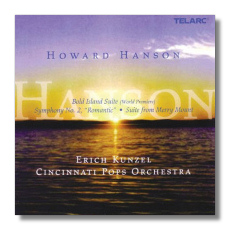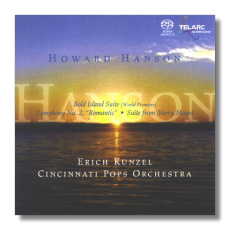
The Internet's Premier Classical Music Source
Related Links
- Hanson Reviews
- Latest Reviews
- More Reviews
-
By Composer
-
Collections
DVD & Blu-ray
Books
Concert Reviews
Articles/Interviews
Software
Audio
Search Amazon
Recommended Links
Site News
 CD Review
CD Review
Howard Hanson

- Fanfare for the Signal Corps
- Suite from Merry Mount, Op. 31
- Bold Island Suite, Op. 46
- Symphony #2 "Romantic", Op. 30
Cincinnati Pops Orchestra/Erich Kunzel
Telarc CD-80649 DDD 66:12
Also released on Hybrid SACD
Howard Hanson was so closely associated with Rochester, New York, and specifically with its Eastman School of Music, that his spirit seemed to work its way into the city's streets, buildings, and parks. I felt it when I attended graduate school at the University of Rochester in the mid to late 1980s. (Hanson died in 1981.) At the time, the local classical music radio station played a snippet from his "Romantic" symphony to usher in its nightly overnight show. Today, each time I hear the symphony's principal theme, I feel that all's right with the world, and that it is time to go to bed! (The "Romantic" Symphony also appeared in a more unlikely setting: it was used in the soundtrack to Ridley Scott's first "Aliens" movie!)
This gorgeous symphony has been recorded several times, and if there's a bad recording of it, I don't know about it. At the same time, it surprises me that it hasn't been recorded more often. Bernstein didn't, and neither did Ormandy, and both of them probably would have been excellent interpreters. I suppose the symphony, written in 1930 for Serge Koussevitzky and the Boston Symphony Orchestra, now is old hat to many – a faded photograph from grandmother's prayer book. It lives up to its subtitle, but not in a weak and swoony way. There's a toughness to this music, a masculine force to be reckoned with, and yet it is not afraid to be gentle and sensitive. Hanson's parents were immigrants from Sweden, and something of the Swedish personality comes out in this work.
Kunzel and the Cincinnati Pops are more likely to recorded Sinatra arrangements and film scores than "serious" classical works, so I found them to be an odd choice for this CD. In spite of that, this is a reading that should make Hanson's name known to a new generation of music-lovers. Compared to Hanson himself, who recorded this symphony twice, Kunzel is low-key, with rounded edges and softer textures. If some of the symphony's tough backbone is missing, no one will deny that Kunzel and the "Pops" play it "romantically." A creditable recording, then, for a new era.
Hanson's brief (1:08) Fanfare for the Signal Corps opens this disc. premièred in 1943 by the Cincinnati Symphony Orchestra, it gets the CD off to a somewhat militaristic start, although Hanson's success at making an unpromising concept both appealing and original deserves recognition. The opera Merry Mount, written shortly after the "Romantic," never really caught on – we've yet to have a studio recording – but the attractive suite is played from time to time. The music's lightness (but not triviality) belies the opera's seriousness. The Bold Island Suite is receiving its first recording here. The island in question is off the coast of Maine, and was Hanson's summer home. The titles of the three movements – "Birds of the Sea," "Summer Seascape," and "God in Nature" – indicate what kind of man Hanson was. This is attractive music, very characteristic of Hanson in its plain-spoken sentiment, in which there is not a trace of effeteness.
These straight-ahead performances are pretty much what Hanson's music needs. I can imagine this music being played with a little more affection, but I don't find Kunzel and the "Pops" objectionable in any way, and I am glad that someone remembers Howard Hanson, who was, after all, more than just the Dean of the Eastman School of Music for four decades. As usual, excellent engineering from Telarc. This recording gets a solid "B" and therefore is recommended.
Copyright © 2005, Raymond Tuttle





















